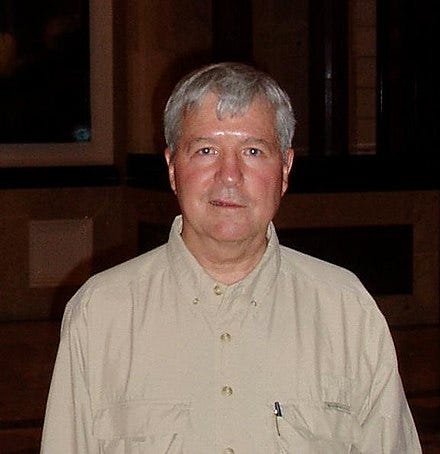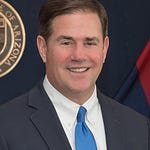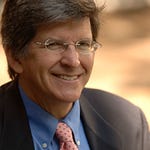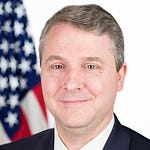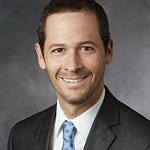Milton Friedman student and University of Chicago-trained monetary economist Warren Coats (Johns Hopkins fellow, former IMF economist and central bank advisor to over 20 countries) speaks about his beginnings as an economist as PhD student of Milton Friedman's at the University of Chicago, his 30 year career at the IMF leading central bank technical assistance developing currencies and monetary policy in countries ranging from post-USSR Eastern Europe, post-conflict Bosnia and Kosovo in the 1990s as well as Afghanistan and Iraq in the 2000s following regime change. We also discuss the future of SDRs and the US dollar as a reserve currency in the International Monetary System along with Warren's experience as chief of the IMF SDR division.
Jon: "Welcome to the Capitalism and Freedom in the 21st Century podcast, where we talk about economics, markets, and public policy, and get into the weeds of all that. My name is John Hartley. I'm your host. And today we have the pleasure of welcoming Dr. Warren Coates, a monetary economist and central bank advisor. He's currently a senior fellow at the John Hopkins Krieger School Institute for Applied Economics. He spent over a 30-year career at the IMF, where he was involved in well over 20 missions to various central banks in various countries around the world. Welcome, Warren.”
Warren: “Thank you very much, John. It's a great pleasure to be here.”
Jon: “I want to start opening this up with, what got you interested in economics to begin with? You did your PhD in economics at the University of Chicago. You studied under Milton Friedman, who is your dissertation advisor and the chair of your committee. How did you first get into economics to begin with, and what led you to studying at Chicago?”
Warren: “John, I'm going to take a sort of long route, because I think it was an interesting path in getting there. I had always seen myself as a physicist. I wanted to be a physicist. And I read that kind of material, et cetera. My senior year in high school, I spent one year in Germany as an exchange student in a very small village, literally on the Iron Curtain. I could walk the dog from the house along the border between East and West Germany. We can come back and explain what East and West Germany was for those who weren't alive then or don't remember. But during that year, my classmates in the gymnasium I attended that year had come with his family from across the border, a nearby village, et cetera. During the course of that year, the whole exchange group, there were about 40 of us, I guess, scattered around Germany, and took several trips, one to Berlin. And I'll come back and tell a little story about that. But it gave me an exposure most people don't have of what life under communism is like and had a profound effect on me. Let me tell you a quick story, though, about Berlin. This may shock some people that there was such a time. That was before the Berlin Wall had gone up. And the center of Berlin culturally and governance-wise, Berlin was the capital of Germany before World War II. The center where the opera house is and so on was in the eastern zone. I should say quickly that at the end of World War II, the allied forces, which was the United States, France, Britain, and Russia, we were allied together against Hitler's Germany, divided up Germany into four sectors, an American sector, French sector, etc., and quickly the three more friendly of the allies, Britain, France, and the United States, consolidated their sectors and the governance of it, etc. Russia did not, and hence the country instead of having four quadrants really, practically speaking, was divided into two, the western and the eastern parts, and Berlin itself, which had been the capital, was also divided into four quadrants, which then became two, western and east Berlin, but Berlin itself was right in the middle of East Germany, so it was a little bit awkward because it was isolated out there. So when we went to Berlin, we went to an opera, the first opera I'd ever attended, and it was in the eastern zone, which was, as I said, the cultural center of a greater Berlin. We were listening to Prince Igor, or watching and listening to Prince Igor, Borodin's famous opera, and there's a dance, the Peloponnesian dances, that many Americans will recognize from an American musical, the name of which I don't remember, it was Desert Song, or something like that, but most anybody would recognize the music from this, and when they began playing that and doing the dance, etc., I turned to my exchange student friend next to me and said, my god, those Russians will steal anything, in case anybody doesn't get that, we stole it from them, it was a Russian piece of music, etc., but this was the state of my naiveté at 18 years old, exploring around East and West Germany. So when I returned home, I went to the local junior college, still majoring in, or starting my major in physics, and anticipating a career in physics, but the campus newspaper, in my view, having freshly come back from the border of East Germany, was not giving a fair picture of the debates between, I think it was Nixon and Kennedy, or something, so my friends and I started our own little underground paper, once a week we published something that we thought gave a more conservative point of view, and I should mention, I forgot to mention, that when I returned, a friend gave me a copy of Barry Goldwater's Conscience of a Conservative, and when I read that, it was like a light bulb going off, you know, it just gave a concrete expression to all the thoughts that had been floating around in my head, watching East Germany and communism in action so nearby during my year as an exchange student. So we, I spent a great deal of time, a lot of my, what would have been party time, I suppose, reading and writing and producing this weekly newspaper. After two years at the junior college, I transferred to the University of California at Berkeley, which was the premier university for physics in the world, Lawrence Radiation Laboratory, and so on. Forgive me if I jump around a little bit, but I left out an interesting episode that I think reflects on my interest in physics. Before going to Germany, just before, I think, I got up at four o'clock in the morning and stood in my backyard and looked to east in order to watch an atomic bomb explosion, a test bomb, in the Mojave Desert. I'm at this moment that I'm speaking about in Bakersfield, California, which is where I was born and grew up. The sky lit up totally, an eerie blue-white kind of light, not normal sort of sunlight, but completely lit up the entire sky. Something like 20 minutes later, I could hear the small boom from the explosion. That's how long, that's how quick speed, that's how fast light travels versus sound, a 20-minute or so difference between seeing the light and hearing the sound. I must have been 16 at the time, a 16-year-old getting up at four o'clock in the morning. That's an event by itself and speaks to how interested I was in physics. So I went off to Berkeley after two years of majoring in physics at the junior college and started my junior year physics major at Berkeley and immediately came to realize that I would have to make a choice between the passions that I had for policy issues that I had been working on with the underground newspaper that we produced and my passion for physics. There was not time for both. I took the choice that I would rather stick with exploring public policies and gave up physics, changed my major, changed to political science, which within a week I realized was a terrible mistake. It was all about party politics and all this stuff, which I had no interest in whatsoever. I was interested in public policy. Somehow out of that, I really didn't know quite what economics was, but somehow out of that I came to realize that economics probably provided the tools and the analysis that I really needed and wanted to be able to explore in a careful, systematic way public policy issues that I was interested in. So I switched to economics and I was in love with it ever since. Extremely happy. It's where my mind wanted to be. Later, a year or two later, my last year at Berkeley was the free speech movement there, if anyone follows that kind of history. It was a time when actually we truly believed in free speech, all the way from the Marxists to the conservatives and the Democrats and Republicans. In between, everybody truly believed in free speech. We all defended everybody's right to express their views on subjects, whatever those views might be, et cetera, unlike the environment that we sometimes encounter today. In this last year, Milton Friedman's daughter, Janet, who was in the law school there, invited her father to come and lecture at Berkeley. And when I went to hear him and then read Capitalism and Freedom, I vowed I will die if I can't study under this man. He took my breath away, he was fantastic, so stimulating, but so clear, and such a friendly person and so on. So the rest of my time at Berkeley was devoted to making sure that I got into Chicago, which I did, studied under Friedman, he chaired my dissertation committee, and whatever success and happiness in life I have, I think, comes from those decisions and having been able to work with Milton Friedman.”
Jon: “Wow. Well, one, I think it certainly, you're not the only economist to have been a physicist first. And I know John Cochran was very interested in physics before he became an economist. Very similar tools, certainly partial differential equations and so forth. You know, Capitalism and Freedom, that came out in 1962, amazing, you know, the influence that it's had on, I feel like, generations of economists. And you came to the University of Chicago after graduating from Berkeley in 1965, and you were there doing your PhD under Milton Friedman, you also had Robert Gordon on your committee. I'm curious, what was it like at Chicago at the time? What was it like in the department? I think this era was really the beginning of expectations playing a role in macro models, you know, thinking, you know, for example, going from sort of the traditional Phillips curve to the expectations augmented Phillips curve. I'm curious, what was your experience like as a graduate student there at the time? Did you find yourself spending a lot of time in the money and banking seminars, which I think were generally attended by Friedman and Becker, or you also had, I think, the international seminars at the time, which I think had Harry Johnson and Bob Mundell. You also had people like Art Laffer, who I think was at the business school at the time. But I'm curious, what was your experience, you know, arriving there as a graduate student? What was it like taking Price Theory under, I assume, Friedman and Becker were teaching at the time. What was that experience like for you?”
Warren: “There's really one word, which is exciting, intellectually challenging, hard work, and always very exciting. We were learning things that we recognized as insightful and useful. The dialogue among the faculty and the students was open and vigorous and challenging. It was just really exciting.”
Jon: “Amazing. In particular, like, did you find, I think one thing that I found really interesting, which you were telling me earlier, is that, you know, in price theory, and I suppose at the time, you would take, you know, effectively the same class, but with a different professor for each quarter. This is, I find, like, very different from today, where, you know, classes are very organized in terms of their topics. If you take a graduate microeconomics class and an economics PhD program, the first semester might be everything from, you know, building up from, you know, preferences to utility to, you know, building demand curves, working all the way to general equilibrium, maybe in your second quarter, you know, getting into topics like game theory or mechanism design, you know, toward the end of that first-year sequence. I feel like this is just a totally different experience. Obviously, Chicago price theory tends to sort of market itself as something different from traditional microeconomics or other graduate microeconomics classes. How would you describe, you know, your Chicago price theory experience?”
Warren: “Well, first of all, as to provide the context, the PhD program at Chicago began by insisting that we master the basics, the fundamentals of micro and macro theory. What was called the core exam was the first big hurdle you had to pass. So these micro courses and the mini courses were the major inputs into what we needed to learn for the core exam. And each professor brought his own flavor. You know, I mean, the core theory was the core theory. One thing about Chicago is they take it seriously. You know, it's real. But each professor has their own slant. So all of us, I think basically everybody, took each of these courses twice, each time with a different professor in order to get the slice or the perspective of that particular professor to the core theory on which most everything else was built. So it was a very, very intense first year, and it laid a fantastic foundation for what followed.”
Jon: “Well, what an exciting time to be a monetary economist at Chicago. This was around the same time that Friedman and Schwartz had published a monetary history of the United States, sort of the advent of monetarism and thinking about the role that money plays in inflation. I feel like this was perhaps just the beginning of that monetarist movement. So after your time at Chicago, you become an assistant professor at UVA and are teaching there. And then after five years there, you join the IMF, and you have this incredible 30-year career, spending three decades there. You join in 1973. This is right as the Bretton Woods system of fixed exchange rates is breaking down. This is after Nixon had closed the gold window. I'm curious about what your time like was there. I want to start by getting into your role as providing technical assistance to foreign central banks as part of an IMF mission. You did this for over 20 countries over your 30-year career, but I think there's a lot of listeners who might not be familiar with what this process is like of the IMF sending missions to foreign central banks for various reasons, perhaps because they're countries that are rebuilding after some conflict or perhaps there's been some monumental change like the collapse of the USSR. I'm curious, what does that involve? For example, you go over with a team to a country and you're working with people at that central bank and with a foreign government. How much time would you spend there on a given trip? And so I presume you'd be flying over there either on a commercial flight or maybe a government flight. I'm curious, maybe starting with the USSR, obviously this was a very interesting time. You have a lot of post-USSR countries in Eastern Europe which are transitioning to becoming market economies that are thinking about adopting their own currencies after having used the Russian ruble for such a long period of time. This is in the early 90s. Obviously some countries would later go on to adopt the euro. You were intimately involved in this process. Can you explain to us a little bit of what that was like in giving technical assistance to these countries that were becoming market economies in Eastern Europe after the collapse of the Iron Curtain? And what is it that an IMF technical advisor to a central bank does in these sorts of scenarios? Maybe every case is a bit different. Can you bring a listener into that sort of room or mindset for someone who's coming from the IMF to assist in the development of either a new currency or a new monetary framework or a new central bank?”
Warren: “Let me start with the collapse of the Soviet Union and the request of 15 new member countries of the IMF for technical assistance in a variety of areas, but the areas that concern me were the central banks of these countries. It was unbelievably exciting, fulfilling, and challenging. These people... I mean, part of what made it so exciting was the eagerness of the central bank staff we worked with in each of these countries. In my case, by that time, by 1992, I had risen to leadership positions in the fund, so I was leading technical assistance missions initially to Kazakhstan and Kyrgyzstan and then later to Moldova and then later to all kinds of countries, but those were the three primary former Soviet republics, which prior to the collapse of the Soviet Union had been the central bank, so-called, of those countries, had been sort of administrative bodies that executed payment orders and took care that the currency was in good shape and issued as needed and transported around. You know, there was no policy involved. They were branches that just executed orders that came from Moscow. Their world changed. They wanted to be like the West. They want to have a vibrant market economy. They wanted to know what central banks did and needed to do in a market economy. So, you couldn’t have wish for more eager and grateful students, if I can call them students, wanting to learn what we had to tell them. So, basically, everything about the structure of those central banks needed to be rethought, redrawn, because they were taking on brand new functions that they had never had before, both in terms of data collection and analysis, development of policy instruments, oversight of a financial sector, which would look very different than it had under the Soviet regime, etc. Everything about what they were doing was new. And it was not only new to them, but it was new to us to understand the starting point, to understand the system they had in place, and had up to that moment that we would need to understand in order to know how to build from there. So, there was an enormous amount of learning on all sides, and students who were just, I keep calling them students, but they were eager to learn everything we could possibly share with them. And that's a wonderful environment to work in. It really is. I just enjoyed it immensely.”
Jon: “That's wonderful. Do you have any particular meetings or dinners that you finally sort of remember looking back to that time? I remember, so I was actually born when the Berlin Wall fell, and my parents always tell me that it was a very sort of happy time in sort of world affairs, which seems to be rare that we have those sorts of moments. But I'm curious, were there any particular meetings that you think back to in that era of sort of post-USSR monetary reconstruction in Eastern Europe?”
Warren: “Absolutely. First of all, for these newly independent countries and newly independent central banks and banking systems, one of the top-of-the-list questions was whether they should introduce their own currency or to continue using the Soviet ruble, which then became the Russian ruble issued by the Central Bank of Russia. And, of course, in that first year, there was no choice but to continue using the Russian ruble. We had a meeting in Tashkent in May of 2092 with all the governors of the newly independent central banks of the former Soviet Union in order to discuss this issue. Should they introduce their own currencies, which they would then need the capacity to manage and to set up the systems by which they would manage and control, etc.? There are a number of quite different options for approaching these things. Or should they continue using the Russian ruble as they were at that moment? And in the event that they chose to continue using the Russian ruble, how would they make their individual policies compatible with the broader ruble area of which the ruble would be a part. So we outlined what we thought would be required of each central bank if it was going to continue to use the currency issued by Moscow, and discussed those. And we discussed how countries that wanted to introduce their own currencies should prepare and go about doing so. Obviously these were very preliminary discussions because each central bank required a lot of work, a lot of reform and laws, staff organized in a different way, trained in a different way to do different things. There was a great deal to be done, especially if they introduced their own currency, but even if they continued to use the Russian ruble, in the end, they all introduced their own currency, which meant they became independent central banks like most other central banks around the world, but with an awful lot of catch-up in order to be able to properly manage that. I will tell a quick story in connection with that meeting with Tashkent, which was particularly memorable for me. In those days, the IMF decided that it was not safe to put us on Russian airplanes. And there were no Western airlines yet serving most of these countries and places. So for a while, most of 1992, we chartered private jets to fly us to our various meetings in the Former Soviet Union. And in the meeting for Tashkent, we flew from Geneva, picked up a colleague in Moscow, and then flew on to Tashkent, five of us, from the IMF. John Honigstein was the head of the newly created European II Department of the IMF, which consisted of the 15 newly independent central banks. And he was overseeing the meeting with the governors that I referred to before, where we discussed all these topics. As it happened, the day we were in the air flying to Tashkent, the 19th of May, was my 50th birthday. So we had a nice little early on celebration in the air in this lovely private jet on our way to Tashkent. So I will forever be grateful for crossing the Rubicon into the post-50s in that particular year.”
Jon: “What an incredible 50th birthday, and also what an amazing time to be living in and just seeing that transition from these post-Soviet states into market economies and into this sort of period of greater freedom. And it's just amazing, too, to be present at these meetings with these countries with this sort of newly gained freedom, with deciding to move away from the ruble and adopt their own currencies. So moving from a happier time to, I think, a slightly more—a much sadder and unfortunate sort of time and place, let's shift to the missions that you were a part of in Bosnia and Kosovo in these sort of post-conflict zones. In the 90s, we have, certainly, the conflict that's going on in Bosnia between Serb-Croats and Bosnians. And we have the Dayton Agreement, which part of this involves shifting from using three currencies in this region to one. I'm curious, what was it like being part of those missions, and what the key features were or things that you felt were interesting or perhaps different from a post-conflict sort of monetary reconstruction compared to something like the USSR, which, fortunately, in that case, ended not in conflict but in a peaceful resolution. What was different from here with Bosnia and Kosovo?”
Warren: “It was night and day in a way. I think I was recruited to lead these missions to Bosnia and Herzegovina because of the work that I had done in Kazakhstan, Kyrgyzstan, and Moldova of transitional economies that gave me some preparation for the post-conflict environment where basically a new central bank needed to be established and built. It was night and day in the sense that the eager, welcoming counterparts in Kazakhstan, Kyrgyzstan, and Moldova were replaced by very unhappy, disagreeable counterparts from the three previously warring sections of Bosnia and Herzegovina. We spent well over a year trying to agree on the provisions of a new central bank law. Basically, the three sections had devolved or sort of collapsed into three quasi-central banks in the three regions. The agreement in Dayton that established a new constitution brought, quote, peace to Bosnia and Herzegovina provided for a new central bank for the entire region with its own currency and so on. So the first task is to agree on what that central bank law will consist of and it took over a year of quite unpleasant meetings. I'll relate just one to give you a bit of the flavor of it. This was in Tali, which was in the Serbian part of Bosnia and Herzegovina, but it's basically a suburb of Sarajevo, which is the capital of the Bosnian Muslim part of the country. And we tried to hold our meetings in the different regions to protect some balance, although it was far easier doing business in Sarajevo because it was so central. But in Tali, where the Serbian government was set up at the time, when we sat down with our counterparts to discuss where we were in addressing the issues we had to resolve in the bank law, they put an interpreter at the front of the room. We had our own, but we really didn't need interpreters because the people we dealt with did speak English, so basically everything was conducted in English. But they put her there, facing us, so that we could stare at her terribly scarred, war-scarred face. She must have been near a bomb that had exploded or something. And that was just the tone of the meetings and the tension. In very good, our meetings would end by somebody bringing in shugavitza, it's a very tasty liqueur from that region, as a way of cooling everybody down. You know, saying, OK, all right, you know, put down your weapons, have a sip, and leave in a Sydney-friendly thing. So for a whole year, it was not pleasant. Not pleasant. Well, I should give you a little bit more context. What were we struggling over in trying to arrive at an agreement with the world? I'm a big supporter of currency-borne rules, which removes any monetary policy of a central bank over the supply of money. It gives complete control over the supply of money to the market. Whenever anybody wants more currency, they buy it at the fixed price. This is the way the gold standard was supposed to work in the old days. And if they found that they had more than they really needed or could, they wouldn't sell it back, they would redeem. So this kind of arbitrage between market prices for the acre of the currency and the currency itself, any divergence between the market price and the official price would give rise to an arbitrage opportunity either to buy more or redeem. In that way, the market fully regulated what the supply of money was. So I think it's a system that most central banks, most countries ought to look seriously at. But in the context of Bosnia and Herzegovina, at that time, by the way, only Estonia, I think, had adopted currency boards in the post-conflict, in the post-Soviet period, which served them extremely well. I mean, the economy boomed and worked really well until they adopted the euro, which was almost like a currency board for them. But the idea was still controversial, not broadly accepted. But the Bosnians, Serbs, and Croats never blinked, never objected for a second to the idea that monetary policy, quote-unquote, would be driven by currency board rules. Currency board rules means you have a fixed price to something. In this case, it was to the euro. At the time, it was actually the German mark, because the euro didn't exist yet. And you let people buy and sell as they wanted at that fixed price. That's it. Nobody argued about that. And the simple explanation was because they didn't trust each other. They wouldn't have trusted any other power that was given to the central bank to exercise control over the money supply. They were absolutely happy to have no control over the money supply and leave it to the market. It was not debated at all. It was just absolutely taken for granted that we couldn't accept anything else. What they argued over was what to call the currency, what alphabet to use, whose picture to put on the picture, how the reserves of the central bank would be allocated between the three different branches in the different parts of the country, and how the ownership. It was all nationalist stuff that was left over from the Civil War that we argued about. I mean, getting a name for the currency was absolutely fantastic. Frustrating because there were some decent sort of neutral names that should have been acceptable, but because they weren't quite ready to agree to anything, they were all rejected. And at the end of the day, when they finally reached the point where there was a green light from the political leadership, okay, get this over with, we'll move forward, so pick a name. The name they picked was horrible. Convertible Marco is the name. But, you know, it's sort of neutral. It describes what was done. So, you know, that's how we got there, just because all the good names were eliminated back when nobody could agree to anything. So anyway, the time there was challenging and difficult.”
Jon: “Wow, that's amazing. And amazing, too, how different it seems, like the issue there really seemed to have much less to do about debating certain monetary dynamics or how a monetary system would work, but really just over what you would actually call that new currency. Really amazing. I want to shift now to, you know, about 10 years in the future, to your work in various missions to Afghanistan and Iraq. You spent quite a bit of time in both these places, partially under the end of your tenure at the IMF before you retired, and a bit afterward, too, when you were working at the Treasury Department under John Taylor, who was the Undersecretary for International Affairs at the time. I feel like this is a very timely discussion in the sense that just last summer, in the summer of 2021, we saw the Taliban regain control of Afghanistan, which was certainly very controversial in the news. But also, part of this was we also saw the world freeze the Afghan central bank assets. And now there's some debate about whether these assets should still be frozen and to what degree sanctions should still be in place in Afghanistan. But I'm curious, you're winding back a clock 20 years after the U.S. invaded Iraq and Afghanistan and went in and removed the Taliban government at the time. I'm curious, as well as the Saddam Hussein regime at the time, I'm curious, going in there after these regimes had been removed, what was it like setting up a currency board and establishing central banks in these countries in the Middle East? What was that like? What was inherited prior to that time? I'm curious, I'm sure that a lot of our listeners would be interested to know. I think a lot of us know sort of the foreign policy and the combat sort of sides to what happened over the past 20 years, but I think a lot fewer people are aware of sort of what was going on in terms of establishing a government, establishing a monetary system and central banks in these places at that time. I'm curious what your involvement was as well as part of these missions.”
Warren: “For both Afghanistan and Iraq, they were largely after I had retired from the IMF. So I was there as a contractor, part of the team, rather than the mission chief leading the team. Let me contrast Afghanistan with Iraq to some extent. First of all, unlike the experience in Bosnia-Herzegovina, and I met some very nice people in Bosnia-Herzegovina. I don't want to give the impression that I didn't, but that doesn't describe all of the enemies. But in Afghanistan and Iraq, I really enjoyed working with the people in their central banks. They were wonderful people, again, eager to learn. Afghanistan's central bank was particularly primitive, if I could put it that way, in terms of the analysis and the policies, tools, and the financial sector itself was quite primitive, very reliant on money changers with cash transactions for almost everything. The banking sector was really quite small, which to some extent was a good thing because there was some major corruption scandals with the banking sector. But what I want to say about my experience in both of them is that, in Afghanistan, it was almost a 15-year period that I was actually going for a couple of weeks at a time, two or three times a year. So it was a long and extensive engagement with them, and it was quite rewarding to watch them grow and mature and deepen their knowledge and understanding. One particular thing that I want to share is that traditionally in Afghanistan, as in so many places, the staffing of the Central Bank was a patronage spoil for many people, so there were maybe half the staff that was totally worthless. I mean, they didn't have the skills needed for the job they were supposed to do, and they were there because a parliamentarian had a cousin or friend or something that needed to be rewarded with a job. The USAID, by the way, I mean, we worked closely and fruitfully in Afghanistan with the World Bank, USAID teams, the U.S. Treasury, and those relationships are not always automatically good or enjoyable, but in Afghanistan they were. It takes a little bit of effort on everybody's part, but it was really working very well. And so over these years, it was quite nice to watch the progress that was being made. But the merit-based human resource system that was worked up and spelled out extensively by the USAID team for who should be hired, when they should be promoted, and things of that sort, what we call typical merit-based HR policies, that you get a job if you qualify for it, you're promoted if you did a good job, and you qualify yourself. None of that existed, and they spelled it all out, but it wasn't being implemented. And the Central Bank governor, Abdul Fitrat, who was with us when we went for the very first time in January 2002, and in the meantime had come back again as governor for another go, there had been some others in between, he came in, looked at this and said, you know, the previous governor kept saying, oh, this is really good, but the time's not quite right yet, you know, to implement this thing. Abdul Fitrat said, now's the time, we're doing it, and he offered a decent, decent to generous severance package for over 1,000 employees to leave. And they did, and the tone and quality of the staff elevated noticeably. You didn't have all these people sleeping on a table or playing cards, you know, because they had nothing else they were capable of doing. They were all, you know, it's bad enough to have ghost employees, but useless employees who were actually there and doing nothing were a bigger drag on morale than somebody who's not there at all and just draws a salary. So anyway, B, jump forward. Move forward a couple of years, another governor comes in who's not quite as strong as Fitra, and gives in a little bit more often to pressure from parliamentarians to hire someone who's not really quite qualified, etc. I was absolutely thrilled at how angry the staff was at this departure from merit-based human resource policy. Why? Because they couldn't compete with the cousins of the parliamentarians. They could compete by doing a better job. And they liked a system that rewarded people who were confident and did a better job. This was quite wonderful to watch. So over the 15 years I was actively involved there, it was slow, steady, with these spurts, but quite rewarding. Quite rewarding. What is appalling is how bad the United States is as an imperial power, which is not really in our DNA, and we should get rid of it, and we should stop sending our armies all over the place and conquering places and trying to rule them, because we're extremely bad at it. Iraq was a worse example, which I can get into. I mean, it was an appalling example of total American incompetence. How was it that for 20 years the U.S. military trained Afghan soldiers who were some of the best, most ferocious fighters in the world, but never thought it was important or necessary to give them the training to be self-sufficient, i.e., to repair the equipment that they were given. They were always totally dependent on the U.S. Army to support them, or contractors to repair their machinery. That's idiocy. I mean, the United States is just bad at doing that, and we should stop doing that. So when we saw the horrendous withdrawal, you know, I'm going on a bit, I apologize, but it has been extremely painful seeing my Afghan friend’s frantically hiding, frantically trying to leave. I worked with people who did not generally work directly with the U.S. government or treasury. They worked for an international organization, the International Monetary Fund. And the U.S. has not even been able to honor its commitment to those who work directly for it to get them out. They've gotten a lot out, but there are a lot that haven't gotten out. But for my friends who did not work directly for the U.S. government, they're not even on the list. You know, this is really painful, really painful.”
Jon: “Well, it's amazing just to hear that, you know, the whole story of the past 20 years in Afghanistan has been certainly an extremely interesting one, and at times very tragic and unfortunate.”
Warren: “John, you asked another question I didn't get to, which was the foreign exchange reserves.”
Jon: “Yeah, I want to close on this. One of the positions that you held at the IMF on top of the technical assistance work you did with various foreign central banks, you were also chief of the FCR division. And I'm curious, you know, the FCR stands for special drawing rights. In many ways, you know, it's composed of a number of currencies that make up various shares. I'm curious, one, what your thinking is, one, what was your timeline there? And I'm curious what you think the future of the SDR is, and in part, you know, what the future of the dollar's role as a reserve currency in the world. I know the one was, you know, added about 10 years ago to the SDR basket. Certainly, right now, you know, today, you know, there's a fair amount of debate around, you know, what the dollar's role would be or how it will be affected by the ongoing conflict in Ukraine since the invasion by Russian forces earlier this year in 2022? I'm curious, one, what do you think about the future of the dollar sort of in the long run? And also, do you think that this recent conflict in Ukraine will create a bifurcated world reserve system? And I think there's some evidence that even prior to the Russian invasion of Ukraine that the dollar has been slipping as a fraction of all world reserves. I'm curious, and of course, it's not just the one that's been gaining. There's been gains on smaller currencies like the Canadian dollar, New Zealand dollar that have been added to some of these central bank reserve baskets. I know the Bank of Israel a few months ago has been pivoting a bit away from the dollar to other currencies like some of the ones I've just mentioned. But I'm curious what your take is on all of this. We're thinking about the international monetary system.”
Warren: “When looking at cross-border payments, the international monetary system, both the pricing of things that sell internationally, oil always comes to mind as a typical example. The market needs and moves toward a single currency in which to price these commodities that trade globally. Similarly, there are real, tangible economies in dealing with what's called a vehicle currency, an intermediate currency between some small, little, unimportant currency that you're paying and some other not so important recipient who is receiving it. For every transactor, for every international trader to have to keep a pot of hundreds of different currencies for all these cross-border purposes, there are really strong economic drivers toward a single so-called vehicle currency. So invariably, in the case I just described, the little country paying for something would first buy dollars and pay dollars, and the recipient would then exchange the dollar for their own currency. The example that I like to use is of the airline industry, where airlines serve thousands and thousands of different airports, but they don't run bilateral flights in and out of every single one. They have hubs. They fly into Chicago and to Dulles or LAX, and you change planes there, and you fly off to the next one. The hub and spoke economizes enormously, even though it seems sort of awkward or unnecessary, but it really is a great economy, and it's the same thing for vehicle currency and cross-border payments. The dollar enjoys some real benefits for playing that role, which is why it has played that role. That is, its purchasing power historically has been reasonably stable, sometimes more so than others, but on average it's been a very stable currency. It has deep and liquid financial markets, which means managing your pot of holdings of dollar assets is easy. There are a lot of things to choose from. You can sell them as you need them. I think there are several reasons why the SDR would potentially play a better job. The easy, non-political one is that being a portfolio, the value of an SDR is the value of a basket of five currencies at the moment for the last five, ten years. Every five years, they review it and make adjustments as necessary to meet certain standards and criteria. But being a basket of five currencies, if you price oil, for example, in an SDR rather than the dollar, and oil is priced in dollars almost universally, it would be a bit more stable than just the dollar itself. Because sometimes the dollar goes up and down, etc., and then you've got a little portfolio. So it has a modest advantage in providing a more stable unit of account, given the way it's currently constructed. There's a basket of five currencies, and it's the market value of those five currencies that tells you what the value of an SDR is in terms of any currency. But then there's the political aspect, which is in our face today, where the U.S. has restricted the use of the dollar, or sanctioned the use of the dollar, with Iran, for example, and now Russia. And to the extent that these restrictive measures are broadly shared by a large number of countries, then nobody except the sanctioned country minds that much, because they're all in agreement with the political objective of restricting the use of their currency. And so the great power of the dollar, as a dominant invoicing unit and a dominant payment unit, serves a good political portion. Unfortunately, the United States too often imposes its own political objectives and purposes that are not so widely shared by the rest of the world. And therefore, these restrictions cause other countries to start looking for alternatives. And I don't need to name names or go into specific examples, there are unfortunately too many of them. But this has been an issue of growing concern. I think those of us who were appalled by Russia's attack on Ukraine didn't mind seeing Russia sanctioned in a variety of ways. But nonetheless, it is driving China, Russia, and a number of other countries to seek more actively than they had in the past alternatives to the dollar for cross-border payments. The SDR has a great advantage here. There are things that I would change about how the SDR is structured. I would turn it into a currency board, rather than the allocation mechanism that's currently in place, and I won't bother to go into those details. But even as it is now, but especially if it's restructured along currency board rules, that people can buy whatever amount they want at the fixed price, has political advantages, because its rules and uses are the result of an international decision of its 102 or however many members there are of the IMF, rather than just the decision of the United States deciding how the dollar is going to be used. So the abuse of the SDR as a payment instrument for political gain, the potential for abuse is dramatically reduced when it's a collective global decision rather than the decision of a single country. So that's another reason that I think the SDR should be given more serious consideration. But at the moment, I'll end with this that the SDR does not have the advantages I described for the dollar earlier of a deep and liquid market in financial instruments denominated in dollars. There are very, very few SDR bonds out there, very, very few goods invoiced in SDRs. The International Public Communications Union, all the satellite stuff and so on, that's all in SDRs. But those uses are very limited. Therefore, it doesn't have at this point the underlying infrastructure that would make it attractive as an alternative. But I think more ought to be done to develop that private use of SDRs, private market use of SDRs, so that it does have those features.”
Jon: “Well, that's fascinating, and it's so interesting to hear about all the debate and data around how the U.S. dollar acts as a major invoicing currency. And a lot of interesting questions about how long the dollar dominance will persist, or if it will be in any way threatened in the near future. Well, Warren, this has been such a wonderful treat to have you on. It's been amazing to hear about your entire story, going from physicist to economist, being inspired by a talk by Milton Friedman at Berkeley, becoming a Milton Friedman student at the University of Chicago in its Howard Economics Ph.D. program, and going from there, becoming a monetary economist and central bank advisor, spending an incredible three-decade career at the IMF, working in unbelievable places, post-USSR states, Bosnia, Kosovo, Afghanistan, and Iraq. It's an amazing experience just getting to listen and hear your stories from doing technical assistance missions for central banks around the world. Thanks so much, Warren, for joining us. This has been another episode of Capitalism in Freedom. Our guest has been Dr. Warren Coates. I'm Jon Hartley, your host. Thanks so much for joining us.”




